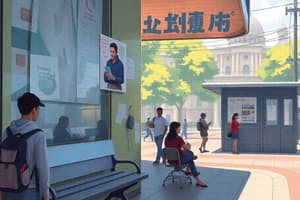Podcast
Questions and Answers
Which of the following is NOT included in the rights affirmed by Article 21 of the Indian Constitution?
Which of the following is NOT included in the rights affirmed by Article 21 of the Indian Constitution?
- Right to private healthcare (correct)
- Right to free legal aid
- Right to a decent environment
- Right to shelter
What is a major challenge faced by water supply departments in urban areas?
What is a major challenge faced by water supply departments in urban areas?
- Excessive government funding
- Lack of public demand for water
- Difficulty in meeting public demand (correct)
- Increased accessibility for impoverished communities
In the context of privatization of water supply, what is a potential drawback?
In the context of privatization of water supply, what is a potential drawback?
- Greater inequality in water access (correct)
- Increased efficiency in management
- Enhanced quality of water supply
- Lower costs for consumers
According to the Supreme Court, what is the relationship between water and the Right to Life?
According to the Supreme Court, what is the relationship between water and the Right to Life?
Who is primarily responsible for providing safe drinking water in rural and urban areas?
Who is primarily responsible for providing safe drinking water in rural and urban areas?
What is one of the responsibilities of the government in a democratic country?
What is one of the responsibilities of the government in a democratic country?
The Right to free education extends to all ages beyond 14 years according to Article 21.
The Right to free education extends to all ages beyond 14 years according to Article 21.
What is considered a fundamental human right under Article 21?
What is considered a fundamental human right under Article 21?
Governments are responsible for providing public facilities such as _______ and _______.
Governments are responsible for providing public facilities such as _______ and _______.
Match the following rights with their descriptions as affirmed by Article 21:
Match the following rights with their descriptions as affirmed by Article 21:
Flashcards
Public Facilities
Public Facilities
General services and institutions used by the public, like transportation, schools, and hospitals.
Government's Role in Public Facilities
Government's Role in Public Facilities
Providing essential public facilities, such as water, sanitation, and education, funded through taxes.
Right to Clean Water
Right to Clean Water
A fundamental human right under Article 21, ensuring access to safe drinking water for everyone.
Water Supply Challenges
Water Supply Challenges
Signup and view all the flashcards
Privatization and Water Access
Privatization and Water Access
Signup and view all the flashcards
Who provides public facilities?
Who provides public facilities?
Signup and view all the flashcards
Article 21: Protection of Life
Article 21: Protection of Life
Signup and view all the flashcards
Narmada Case
Narmada Case
Signup and view all the flashcards
Water Access Inequality
Water Access Inequality
Signup and view all the flashcards
Study Notes
Public Facilities and the Role of Government
- Public facilities are services, institutions, and resources available to the general public.
- Examples include trains, buses, roads, power, and water supply.
- Governments are responsible for ensuring access to these facilities.
- Representatives in Parliament and State legislatures are elected by the people and thus are responsible for providing certain general facilities to the population.
- The government generates revenue through taxes to fund these services.
- Governments provide water, sanitation, healthcare, education, and transportation facilities.
Right to Water Supply
- The Right to clean water is a fundamental human right in India, guaranteed under Article 21 of the Indian Constitution.
- State governments are responsible for managing safe drinking water in rural and urban areas.
- Municipal authorities manage water supply in urban areas.
- Often, municipal water supply departments cannot meet the demands of the people.
- Some people have access to water from private companies or by digging bore wells but price can be prohibitive.
- Those in slums often lack access to sufficient water.
- Privatization of water resources could increase efficiency but also increase inequality as the cost would become prohibitive to the poor.
Studying That Suits You
Use AI to generate personalized quizzes and flashcards to suit your learning preferences.




